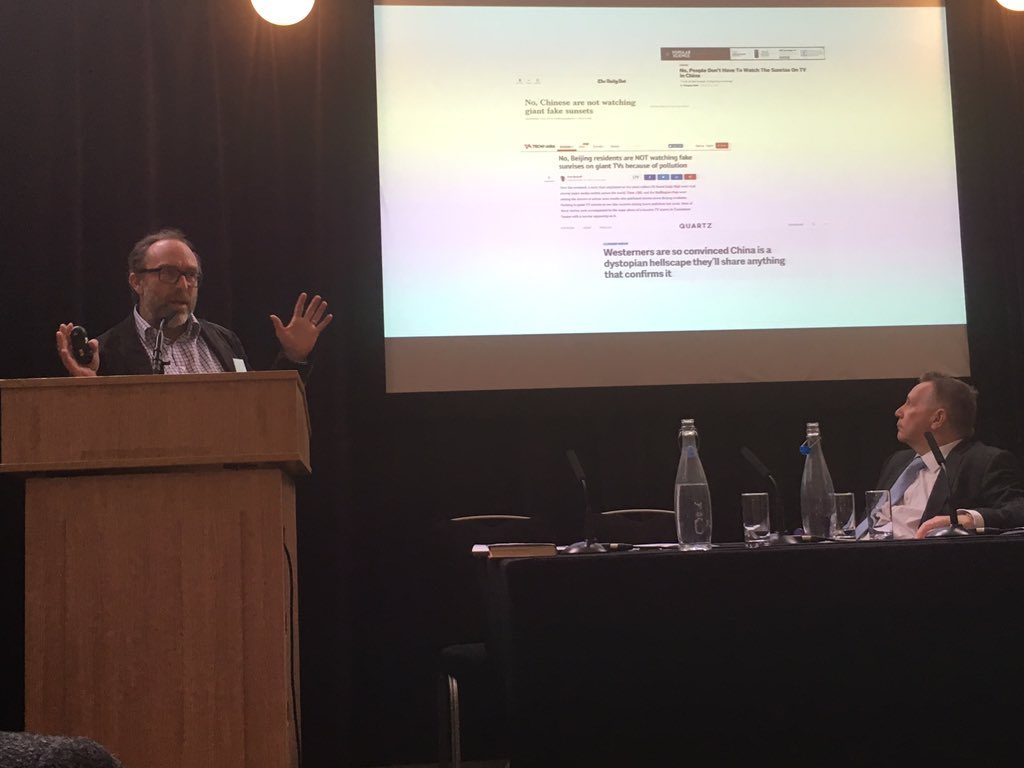Index relies entirely on the support of donors and readers to do its work.
Help us keep amplifying censored voices today.
[vc_row][vc_column][vc_column_text]

Wikipedia co-founder Jimmy Wales speaking at Westminster Media Forum, April 2018. Credit: Daniel Bruce
“The advertising-only business model has been incredibly destructive for journalism,” said Wikipedia co-founder Jimmy Wales at a Westminster Media Forum event on Thursday 26 April 2018 in London that looked at “fake news”.
“We need to resolve the incentives so that it makes sense and is financially sustainable to do good news,” Wales added.
Wales cited examples of false news stories that had been published on the Mail Online, such as an article featuring a projection of a perfect horizon in Beijing, erected as a way to compensate for the pollution, which proved fake, and a story claiming the Pope supported Donald Trump. He said the Daily Mail of 20 years ago was different. While not what he would choose to read, he thinks there is a place in the media landscape for tabloids, but one running fake news is “a quantum leap we should be very concerned about”.
Suggesting alternatives to advertising-only models, Wales said the Guardian’s donation request box (which he admitted he had consulted on) was an excellent example of how a media organisation can earn money without compromising standards. Meanwhile, a total paywall was very beneficial for some media, in particular financial media, with those readers valuing inside knowledge on the markets, though it would not suit all (the Guardian’s Snowden files, for example, were information he said he would want everyone to be able to access at the same time).
Wales’s concerns about the advertising-only, clickbait-style media models were echoed by others throughout the conference. Drawing an impressive panel of industry experts across media, law and tech, they all united in the view that while fake news meant a myriad of things to many different people, and was not something new, it was nevertheless problematic. Mark Borkowski, founder and head of Borkowski PR, spoke of the 19th-century great moon hoax and how “everything is different and everything is the same” before adding: “The speed at which we expect to get information, without proper fact-checking, is a plague.”
Nic Newman from the Reuters Institute for the Study of Journalism proposed different ways for media to gain more trust, of which “slowing down” was one. Richard Sambrook, former director of global news at the BBC and now director of the Centre for Journalism at Cardiff University, said the rise in the number of opinion pieces over evidenced-based journalism was because they were cheaper to commission.
Better education about what constitutes good quality, reliable media was another solution proposed.
“Audiences need better education and sensitivity around algorithms,” said Kathryn Geels, from Digital Catapult.
Katie Lloyd, who is development director at the BBC’s School Report and who runs workshops around the country educating school children into news literacy, said there was a sense of urgency and confusion when it came to the topic and that teachers feel like it really needs to be taught.
“Young people are on the one hand savvy and on the other not so much and need extra help,” said Lloyd, adding that of those children she had interacted with, most knew what fake news was in principle, but not how to spot it.
“When we started talking to teachers they said they didn’t have the tools and the skills to teach it,” she added, tapping into a point raised by head of home news and deputy head of newsgathering at Sky, Sarah Whitehead, who said media education was just as important for older people as it was for the young, as the world of online was not the domain of only one group.
Lloyd also explained that diversity was essential when it came to who was delivering news as people were more likely to trust news from those they could relate to. This was in response to an audience member saying they had spoken to school children who expressed that they respected news on Vice over the BBC. Lloyd agreed that it was essential for news organisations to have a wide range of people in terms of age and background. [/vc_column_text][/vc_column][/vc_row][vc_row][vc_column][vc_basic_grid post_type=”post” max_items=”4″ element_width=”6″ grid_id=”vc_gid:1524822984082-ad9d065c-d104-5″ taxonomies=”6564″][/vc_column][/vc_row]